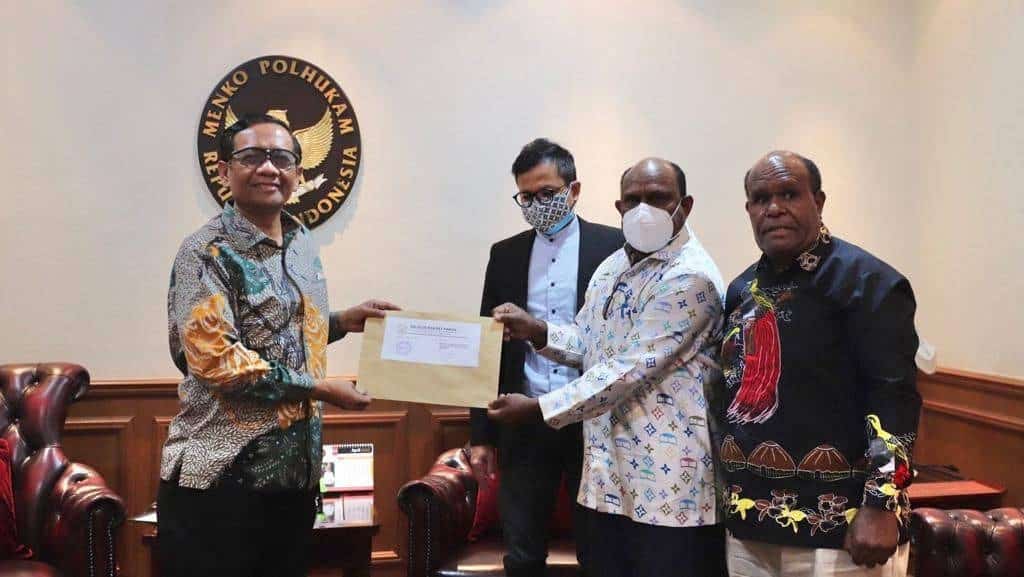Jakarta, Jubi TV– Coordinating Minister for Political, Legal, and Security Affairs Mahfud MD received the Papuan People’s Assembly (MRP) and Amnesty International Indonesia at this office on Friday, April 15, 2022.
Present at the meeting were MRP Chair Timotius Murib, MRP Deputy Chair Yoel Luiz Mulait, Special Staff to MRP Chair Onias Wenda, and Amnesty International Indonesia Executive Director Usman Hamid.
MRP conveyed several issues to Mahfud MD, including the concern of new mining in the Wabu Block after the Freeport contract extension.
Mahfud denied there was any new mining in the Wabu Block. “Mining has only been carried out by BUMD (region-owned enterprises) and BUMN (state-owned enterprises) while still paying attention to the rights and welfare of the community and indigenous peoples. Until now, there is no new Mining Business Permit (IUP),” Mahfud wrote on his official Instagram account @mohmahfudmd.
“The MRP on this occasion also submitted a letter of aspiration to President [Joko Widodo], which I have accepted and will convey to the President,” Mahfud added.
Other than conveying aspirations related to mining in Papua, the MRP regretted the steps taken by Commission II of the House to push for the expansion of the Papua Province.
“The Legislative Body of the House quickly approved three new autonomous regions bills on April 6, 2022. Less than a week later, on April 12, the bills were approved by the Plenary Meeting of the House to become the House’s Initiative Bill, namely the Bill on the Establishment of the South Papua Province, the Bill on the Establishment of the Central Papua Province, and the Bill on the Establishment of the Central Mountains Province. This is very rushed and not participatory,” said Yoel Luiz Mulait.
“Therefore, the MRP requests that the entire implementation of the second revision of the Special Autonomy Law, especially the plan for the expansion and formation of new autonomous regions in Papua, be postponed until there is a final decision from the Constitutional Court examining the judicial review of the new Papua Special Autonomy Law,” Yoel added.
Meanwhile, Usman appreciated Mahfud’s explanation that the government would pay attention to the rights and welfare of indigenous peoples before mining gold. “Mahfud also said that the government would pay attention to the recommendations from Amnesty’s study on the gold mine plan in the Wabu Block, Intan Jaya. The findings from our research have also been discussed in the meeting between Mahfud MD, the Minister of SOEs, the Minister of Investment, and the President,” he said.
Many Papuans are worried that the formation of new autonomous regions will be followed by the deployment of more troops, the establishment of new territorial military units, along with the formation of regional police in the new provinces. On March 21, Amnesty International Indonesia launched a report titled “The Gold Hunt: Wabu Block Mining Plans Risk Aggravating Human Rights Violations in Papua.” In this report, Amnesty documented an alarming increase in security forces in the area since 2019, from two to 17 military posts.
Amnesty also noted there were at least 12 allegations of unlawful killings involving security forces, including increased restrictions on freedom of movement, beatings, and arrests that were often experienced by the indigenous Papuans. Residents of Intan Jaya told Amnesty that they used the proposed mining area to cultivate crops, hunt animals, and collect wood.
“By ignoring the needs, wishes, and traditions of the indigenous Papuans, the development of the Wabu Block risks exacerbating the already deteriorating human rights situation in Papua,” said Usman. Therefore, Usman hopes, the government’s plan to form new autonomous regions in Papua will take into account the implications of politics, law, security, and the human rights situation in Papua. (*)













